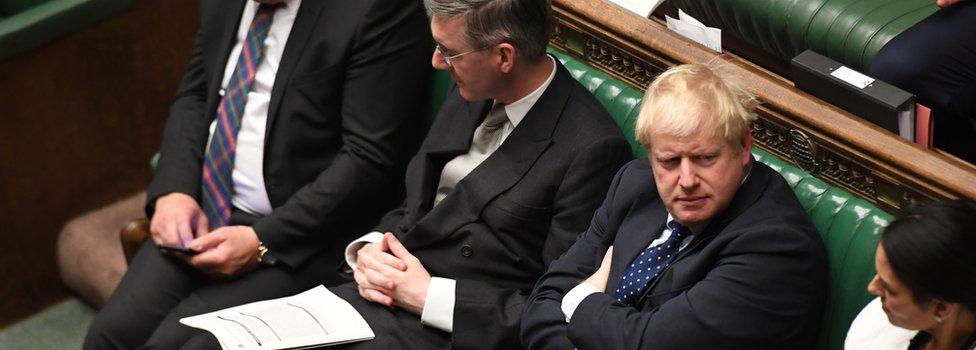Brexit: Johnson 'very confident' MPs will back deal
- Published
Boris Johnson: "They will want to vote for it on Saturday"
Boris Johnson says he is "very confident" MPs will back the Brexit deal he has struck with the EU - despite the DUP's opposition to it.
The prime minister claimed he would win what is expected to be a knife-edge Commons vote on Saturday.
"This is our chance in the UK as democrats to get Brexit done, and come out on 31 October," he said.
The DUP is against concessions he made to the EU on customs checks at points of entry into Northern Ireland.
The party's deputy leader, Nigel Dodds, accused the prime minister of being "too eager by far to get a deal at any cost".
The PM must win support for his deal from Brexiters on his own side, as well as from 23 former Tory MPs who now sit as independents - including 21 whom he kicked out of the Tory parliamentary party last month after they rebelled against him in a bid to prevent a no-deal Brexit.
He must also convince Labour MPs concerned about protection for workers and the environment in the new deal.
Shadow Brexit secretary Sir Keir Starmer said Labour would oppose the deal, citing concerns it would allow the UK to move further away from EU regulations in the future.
He said the new agreement "paves the way for a decade of deregulation" and argued it would give the government "licence to slash" worker, environment and consumer protections.
Speaking in Brussels, Mr Johnson denied he would meet the same fate as his predecessor Theresa May, who repeatedly failed to get a Brexit deal through Parliament.
"I am very confident that when my colleagues in Parliament study this agreement that they will want to vote for it on Saturday and in succeeding days," he said at an EU summit in Brussels.
DUP concerns
Appealing to the DUP, which the government relies on for support in key Commons votes, he insisted the UK could leave the EU "as one United Kingdom" and "decide our future together".
Mr Dodds earlier said he expected a "massive vote" against Mr Johnson's deal on Saturday in the House of Commons - and the DUP expected to "play a crucial role" in amending the legislation.
The new deal is largely the same as the one agreed by Theresa May last year - but it removes the controversial backstop clause, which critics say could have kept the UK tied indefinitely to EU customs rules.
Northern Ireland would now remain in the UK's customs union, but there would also be customs checks on some goods passing through en route to Ireland and the EU single market.
DUP: PM 'too eager for deal at any cost'
The DUP said: "This is not acceptable within the internal borders of the United Kingdom."
The party also objects to Northern Ireland potentially being part of a different VAT regime to the rest of the UK and is concerned about the deal violating the Good Friday Agreement's principle of consulting the nationalist and unionist communities on important issues.
European Commission President Jean-Claude Juncker caused a flurry earlier when he said there was no need for a Brexit extension as "we have a deal".
This was seen as a major boost for Mr Johnson, who has always insisted he would not go beyond 31 October - even if he was forced to ask for an extension under the terms of the so-called Benn Act, which kicks in on Saturday if MPs vote his deal down.
But Mr Juncker's EU colleagues were more cautious, with European Council President Donald Tusk saying he would "consult" member states about an extension if necessary.
At a joint press conference, Mr Tusk, Mr Juncker, EU chief negotiator Michel Barnier and Irish Taoiseach Leo Varadkar all expressed regret that the UK was leaving the EU.
Mr Tusk said: "On a more personal note, what I feel today, frankly speaking, is sadness, because in my heart I will always be a Remainer, and I hope that our British friends decide to return one day, our door will always be open."


Can Boris Johnson win the vote?
The winning post for votes in the House of Commons is 320 if everyone turns up - seven Sinn Fein MPs don't sit and the Speaker and three deputies don't vote.
There are currently 287 voting Conservative MPs. The prime minister needs to limit any rebellion among them.
Then, if the DUP won't support his deal, he'll need the backing of 23 former Conservative MPs who are currently independents. Most will probably support the deal, but not all.
That's still not quite enough, though, so the PM will also need the backing of some Labour MPs and ex-Labour independents. In March, when MPs voted on Theresa May's deal for the third time, five Labour MPs backed it, plus two ex-Labour independents.
This time it's likely to be a bit higher than that because several MPs have said they would now back a deal.
All this still leaves the vote very close. And it's possible some MPs could abstain, making it even harder to predict the outcome.

Do you have any questions about the proposed Brexit deal?
In some cases your question will be published, displaying your name and location as you provide it, unless you state otherwise. Your contact details will never be published. Please ensure you have read the terms and conditions.
Use this form to ask your question:
If you are reading this page on the BBC News app, you will need to visit the mobile version of the BBC website to submit your question on this topic.